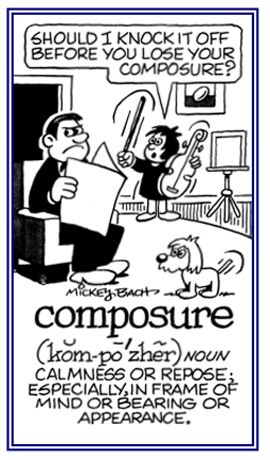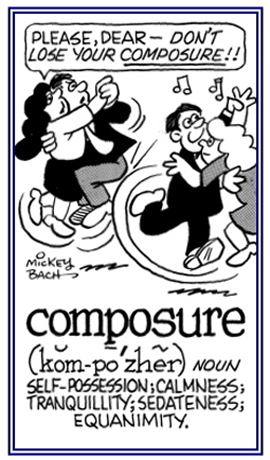pon-, posit-, pos-, -poning, -poned, -ponency, -ponent, -ponement, -pound
(Latin: to place, to put, to set; placement, positioning)
compositely (adverb), more compositely, most compositely
1. A compilation of something made up of distinct parts: The compositely designed photograph superimposed old pictures with new ones of the same architectural site.
2. Relating to the family of dicotyledonous herbs, shrubs, and trees which are characterized by dense flower heads that look like a single blossom: Holly thought the florist had several examples of bushes which would look great in her garden; especially, given their compositely colorful blossoms.
3. A description of something combining the typical or essential characteristics of individuals making up a group: The makeup of the crowd was definitely a compositely diverse one.
2. Relating to the family of dicotyledonous herbs, shrubs, and trees which are characterized by dense flower heads that look like a single blossom: Holly thought the florist had several examples of bushes which would look great in her garden; especially, given their compositely colorful blossoms.
3. A description of something combining the typical or essential characteristics of individuals making up a group: The makeup of the crowd was definitely a compositely diverse one.
1. Something made up of separate components or elements: For her examination, Pam was given a sentence that had difficult to analyze compositeness and she was asked to identify all the parts of speeches.
2. A conceptual whole made up of complex sections: The three-act play was a good example of the compositeness of the written word which was complicated but related.
2. A conceptual whole made up of complex sections: The three-act play was a good example of the compositeness of the written word which was complicated but related.
1. The way in which something or constituents thereof are combined or arranged: The family composition in the portrait was very pleasing.
3. The act or process of combining things or ingredients to form a unified whole: What is the composition of this delicious cake recipe?
4. The act or process of creating something; such as, a piece of music or writing: The teacher graded Mary's composition, "Flowers in My Garden", and gave her a good grade for her efforts.
5. The formation of larger words made up of smaller separate words: The term "wordsmith" is a composition made from two separate words, "word" and "smith".
6. The setting of type in preparation for printing: During his newspaper career, the editor, Mr. Jackson, became an expert in the composition of eye catching headlines.
The composition of the apartment building is diverse, including residents from many walks of life.
In the art lecture, the instructor, Mr. Straight, described parts of a visual image of an artist's composition of a group portrait.
2. The spatial property resulting from the arrangement of segments in relation to each other and to the whole: The art students were studying the three dimensional compositions in many of the famous artist’s abstract works that were on display at the local gallery.3. The act or process of combining things or ingredients to form a unified whole: What is the composition of this delicious cake recipe?
4. The act or process of creating something; such as, a piece of music or writing: The teacher graded Mary's composition, "Flowers in My Garden", and gave her a good grade for her efforts.
5. The formation of larger words made up of smaller separate words: The term "wordsmith" is a composition made from two separate words, "word" and "smith".
6. The setting of type in preparation for printing: During his newspaper career, the editor, Mr. Jackson, became an expert in the composition of eye catching headlines.
1. A mixture of decaying plants, leaves, and manure; all of which are used to enrich the soil for planting: Every spring, Jim, the farmer, ploughs the compost into the fields to fertilize his crops.
2. A combination or blending: Farmer Jim wants to avoid using chemical compost and to keep using organic compost for his crops.
2. A combination or blending: Farmer Jim wants to avoid using chemical compost and to keep using organic compost for his crops.
compost (verb), composts; composted; composting
To change organic materials into fertilizer: Larry plans to compost the leaves from his trees and grass enriching the soil for his backyard garden.
The Nelsons have been composting vegetation for natural farming for many years.
1. A calm or tranquil state of mind; self-possession or self-control: Harriet's composure was shown by her relaxed and comfortable behavior even when she was under pressure to complete her chemistry assignment in the laboratory.
2. Steadiness of mind under stress: Celia's father accepted her problems with composure and her mother also reacted with equanimity.
3. Calm and steady control over the emotions: As a social worker, it takes strong composure to listen to the information that clients provide about their hazardous lives.

© ALL rights are reserved.

© ALL rights are reserved.

© ALL rights are reserved.
Go to this Word A Day Revisited Index
2. Steadiness of mind under stress: Celia's father accepted her problems with composure and her mother also reacted with equanimity.
3. Calm and steady control over the emotions: As a social worker, it takes strong composure to listen to the information that clients provide about their hazardous lives.



Go to this Word A Day Revisited Index
so you can see more of Mickey Bach's cartoons.
1. A building or buildings; especially, a residence or group of residences, set off and enclosed by a barrier: During medieval times, valuable farm animals were kept in a compound near the house at night.
2. Composed of many distinct individuals united to form a whole group or a colony: The artists, including painters, potters, and glass blowers, lived in a compound and marketed their products under one brand name.
3. An enclosed area used for confining prisoners of war: There was great rejoicing in the community when the local prison compound was closed.
4. Consisting of two or more substances, ingredients, elements, or parts: The druggist, Mr. Evans, mixed a special compound for Anita's cough.
2. Composed of many distinct individuals united to form a whole group or a colony: The artists, including painters, potters, and glass blowers, lived in a compound and marketed their products under one brand name.
3. An enclosed area used for confining prisoners of war: There was great rejoicing in the community when the local prison compound was closed.
4. Consisting of two or more substances, ingredients, elements, or parts: The druggist, Mr. Evans, mixed a special compound for Anita's cough.
Many chemists utilize various kinds of compounds that consist of some other compound or compounds.
1. Anyone who mixes different things: A pharmacist, for example Mrs. Richison, is a compounder of medicines and unguents (salves that are put on cuts or rashes).
2. Someone who attempts to bring people to terms of agreement: Mr. Lawson, the president of the company, served as the compounder at the settlement conference with the labor union.
2. Someone who attempts to bring people to terms of agreement: Mr. Lawson, the president of the company, served as the compounder at the settlement conference with the labor union.
1. Placing over against or in an opposite position: Christopher, the composer, wrote some music for the bassoon to be in contraposition to the part for the flute.
2. An opposition, a contrast, or antithesis: Attorney Younge's argument for the ongoing imprisonment of the youth was in contraposition to that of the judge in the court.
2. An opposition, a contrast, or antithesis: Attorney Younge's argument for the ongoing imprisonment of the youth was in contraposition to that of the judge in the court.
counterpose (verb), counterposes; counterposed; counterposing
1. To set in contrast, opposition, equilibrium, or balance: Dirk will be counterposing the arrangement of the furniture in the room with the windows.
2. To offer or to place in opposition, response, or contrast: Jane's argument was counterposing that of the rest of the panel.
3. To constitute a counterweight or counterbalance to someone or something: The presence of the school principal, Mr. Pyott, counterposed the input from community leaders.
2. To offer or to place in opposition, response, or contrast: Jane's argument was counterposing that of the rest of the panel.
3. To constitute a counterweight or counterbalance to someone or something: The presence of the school principal, Mr. Pyott, counterposed the input from community leaders.
decompose (verb), decomposes; decomposed; decomposing
1. To separate into constituent components, or to cause something to separate into its constituent components: In the science laboratory, the students attempted to decompose the odd mixture in the test tubes.
2. To break down organic matter from a complex to a simpler form, mainly through the action of fungi and bacteria, or to be broken down in this way: Once Jack places vegetation in the compost pile, it starts to decompose and to decay.
3. To break something down into smaller or simpler fragments: The organic waste in the composter will decompose over the winter and be mixed into the garden in the spring.
2. To break down organic matter from a complex to a simpler form, mainly through the action of fungi and bacteria, or to be broken down in this way: Once Jack places vegetation in the compost pile, it starts to decompose and to decay.
3. To break something down into smaller or simpler fragments: The organic waste in the composter will decompose over the winter and be mixed into the garden in the spring.
decomposite (adjective), more decomposite, most decomposite
A description of solutions that have been combined or mixed more than once: The decomposite mixture was added to the test tube to determine the inflammable nature of the new mixture.
1. The act or process of breaking down organic matter from a complex to a simpler form, mainly through the actions of fungi and bacteria: The decomposition of the grass that was mowed from Sam's lawn provided fertilizer for his flowers and bushes.
2. The separation into constituent parts during the dissolution of the removal or alteration of some of the ingredients of a compound: The university students, Becky and Brenda, were researching the decomposition of woods, rocks, and other natural elements. 3. The act of or result of the decaying process of matter: The new composter in the garden really facilitated the decomposition of all the vegetable materials put into it.
4. The biological breakdown or decay of natural substance: In the biology laboratory, Doug, Gary and Ray studied the decomposition rates of various living ingredients.
2. The separation into constituent parts during the dissolution of the removal or alteration of some of the ingredients of a compound: The university students, Becky and Brenda, were researching the decomposition of woods, rocks, and other natural elements. 3. The act of or result of the decaying process of matter: The new composter in the garden really facilitated the decomposition of all the vegetable materials put into it.
4. The biological breakdown or decay of natural substance: In the biology laboratory, Doug, Gary and Ray studied the decomposition rates of various living ingredients.
decompound (adjective), more decompound, most decompound
1. Leaves having divisions that are themselves a union of elements or parts: There are leaves of several tropical palm trees that are examples of decompound leaves.
2. Consisting of things or parts that are already combinations of two or more elements or sections: The complex decompound sentence consisted of several short sentences, linked by the word "and".
2. Consisting of things or parts that are already combinations of two or more elements or sections: The complex decompound sentence consisted of several short sentences, linked by the word "and".
depone (verb), depones; deponed; deponing
1. To make a deposition, to testify, or to declare something under oath: The lawyer, Mr. Lawson, prepared Hans, the client, to depone in court.
2. To give evidence or to testify under oath, either in a written or a verbal form: Because Celia, the witness, was ill, she was allowed to depone her confirmation in a sworn affidavit.
2. To give evidence or to testify under oath, either in a written or a verbal form: Because Celia, the witness, was ill, she was allowed to depone her confirmation in a sworn affidavit.
Related word families intertwined with "to place, placing, to put; to add; to stay; to attach" word units: fix-; prosth-; stato-; the-, thes-.


